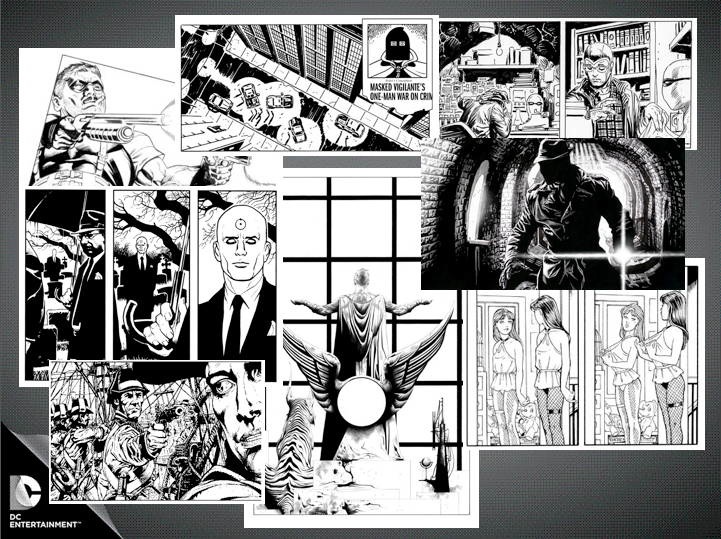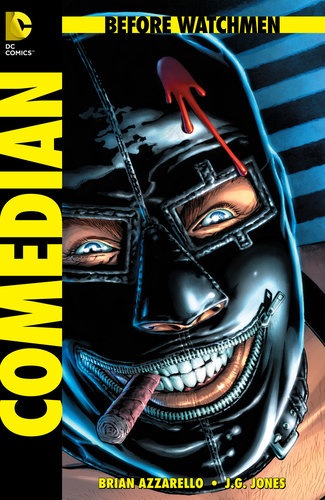When I first read Watchmen, I was in high school. I didn't catch all the references. I didn't understand all of the history, or completely comprehend the political landscape and culture that had influenced it. When I read it again I understood a little bit more, appreciated it on a deeper level, caught jokes and concepts that were lost on me in youth. Like Catcher in the Rye, (Yes, I'm THAT GUY about Catcher in the Rye,) I can read Watchmen again and again and have a new realization, fall in love with a different character, ask a question about life I hadn't thought of before.
Watchmen isn't just a comic book, it's an award winning piece of art and literature. I mention this because a new comic book series is being released by DC, called Before Watchmen, and while many insanely awesome writers and artists are attached to the project ( "Among the creators involved are writers J. Michael Straczynski, Brian Azzarello, Darwyn Cooke, and Len Wein, and artists Lee Bermejo, J. G. Jones, Adam Hughes, Andy Kubert, Joe Kubert, and Amanda Conner" {http://is.gd/2RYmmw}), it is asking an important question about creator's rights that has comic book fans in a civil war.
On one hand, the creators. Knowing how Watchmen affected me and many other people, I can't help but sympathize with Alan Moore. Moore and DC's history has been strained to say the very least, with the Watchmen writer feeling cheated by their contracts together. A little history:
"Moore and Gibbons both signed a contract in the '80s with the reasonable expectation that their work would be returned to them once it dropped out of print and the characters weren't being used anymore. When Moore realized that he'd never get the rights back, that DC was actually using underhanded tactics to produce merchandise without paying Gibbons and Moore, and that they were about to implement a ratings system he disagreed with, he left. He decided to never work for DC again." {http://is.gd/T8K76C}
"In 2000, Moore publicly distanced himself from DC's plans for a fifteenth anniversary Watchmen hardcover release as well as a proposed line of action figures from DC Direct. While DC wanted to mend its relationship with the writer, Moore felt the company was not treating him fairly in regards to his America's Best Comics imprint (launched under the WildStorm comic imprint, which was bought by DC in 1998; Moore was promised no direct interference by DC as part of the arrangement). Moore added, "As far as I'm concerned, the 15th anniversary of Watchmen is purely a 15th Anniversary of when DC managed to take the Watchmen property from me and Dave [Gibbons]." {http://is.gd/amVeU3}
"In 2010, Moore told Wired that DC offered him the rights to Watchmen back earlier that week, if he would agree to prequel and sequel projects. Moore said that "if they said that 10 years ago, when I asked them for that, then yeah it might have worked ... But these days I don't want Watchmen back. Certainly, I don't want it back under those kinds of terms." {http://is.gd/2RYmmw}
"Moore criticized the project, calling it "completely shameless", and stated he was not interested in monetary compensation, but rather “What I want is for this not to happen.”[6] Moore elaborated, "What the comics industry has effectively said is, 'Yes, this was the only book that made us briefly special and that was because it wasn't like all the other books.' Watchmen was something that stood on its own and it had the integrity of a literary work. What they've decided now is, 'So, let's change it to a regular comic that can run indefinitely and have spin-offs.' and 'Let's make it as unexceptional as possible.' Like I say, they're doing this because they haven't got any other choices left, evidently." {http://is.gd/2RYmmw}
Ouch. Can you imagine creating characters, having them held hostage from you by a giant company and then having their stories told by not-you against your will? Isolating yourself spitefully and watching your peers apathetically inventing their lives, knowing you have their origins in your head, knowing that only you could ever really tell them?
On the other hand, business is business. Moore signed the contract, right? It sucks, but corporations are evil and media industries are notorious for doing bad business with artists. Even if that doesn't justify it, should scores of comic book fans be expected not to enjoy the ideas of different artists with new twist on classic characters? Essentially it's an epic fanfic and the talent of the artists involved can't be lessened by Moore's bitterness. I still have a Vampirella ashcan signed by Amanda Conner when I met her at a convention in middle school. I grew up with a lot of these creators and I'm interested to see what they will do.
On the mysterious third hand, there's philosophy to ponder. I'm an artist (and in my mind and sketchbooks a comic book writer) and I've often wondered about that- once you create something, is it really yours at all? Does art exist in some mysterious realm that can not really be claimed? These days creator's rights are flagrantly ignored not by the corporations but by the fans themselves who endlessly pirate everything from music to comics to books. Perhaps the conversation on creators rights and how artists will make their money needs to be updated across the creative board.
I struggle with emotional outrage and comic curiosity! Meanwhile, here's that ashcan I mentioned!:














No comments:
Post a Comment